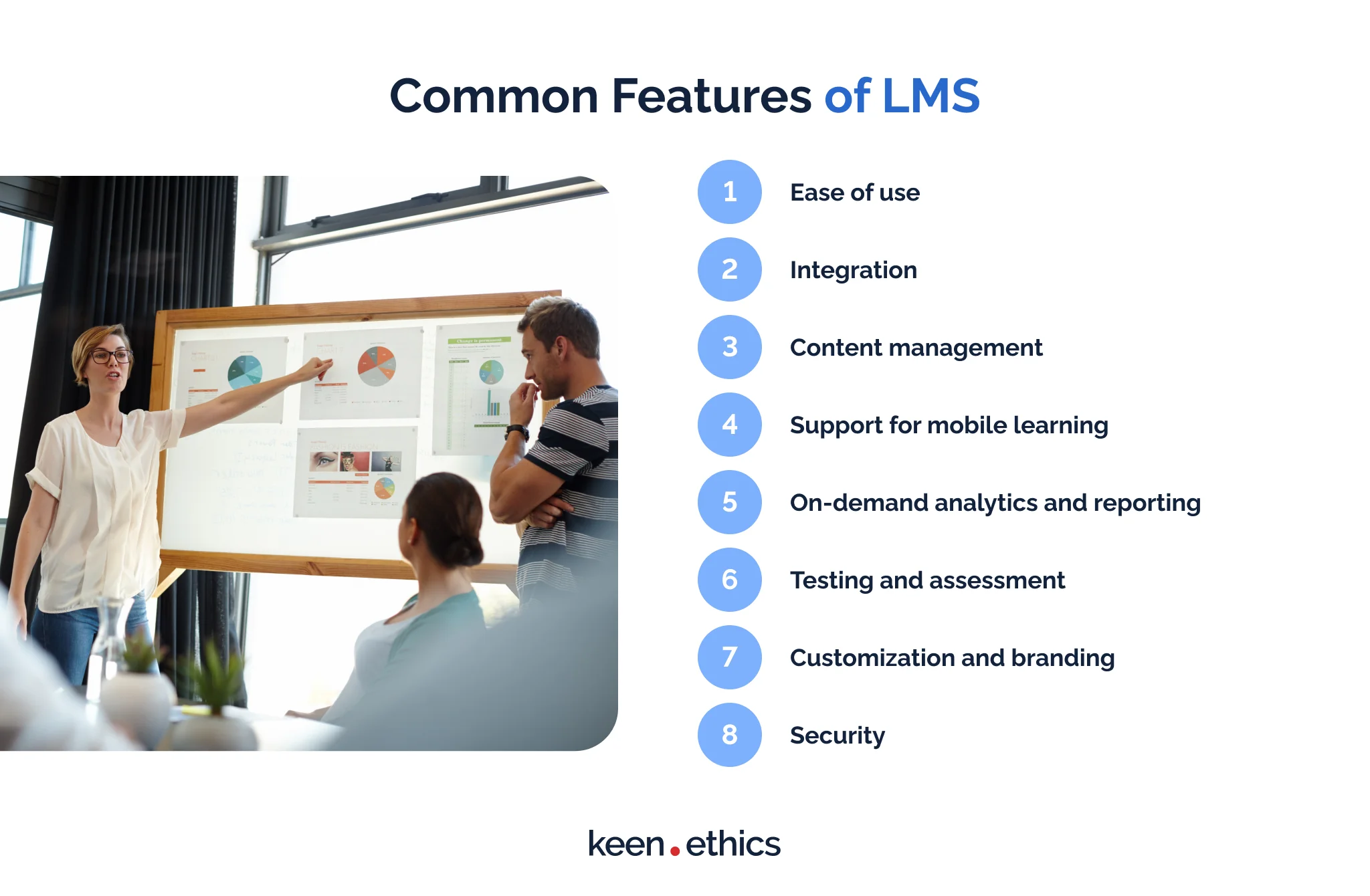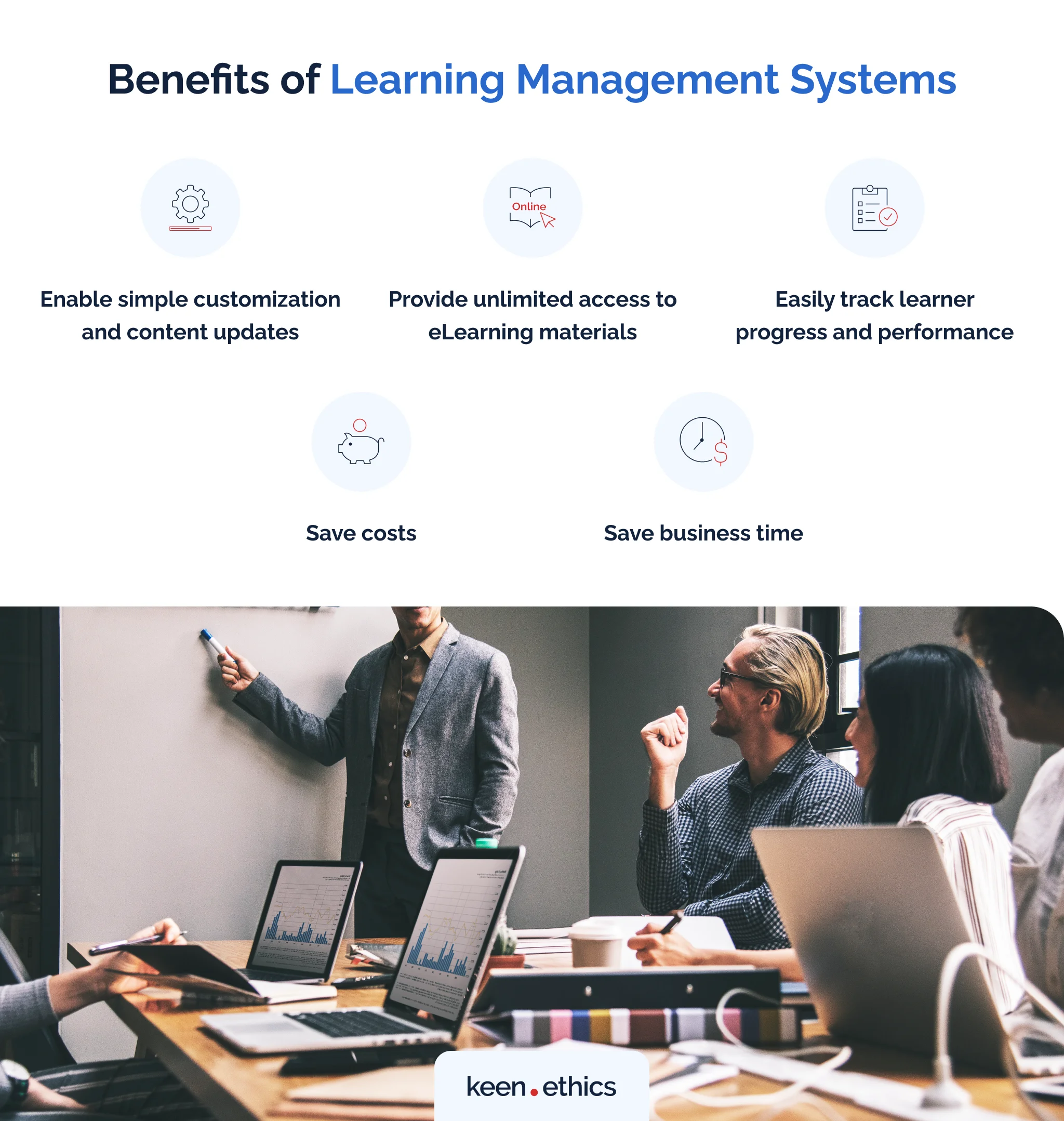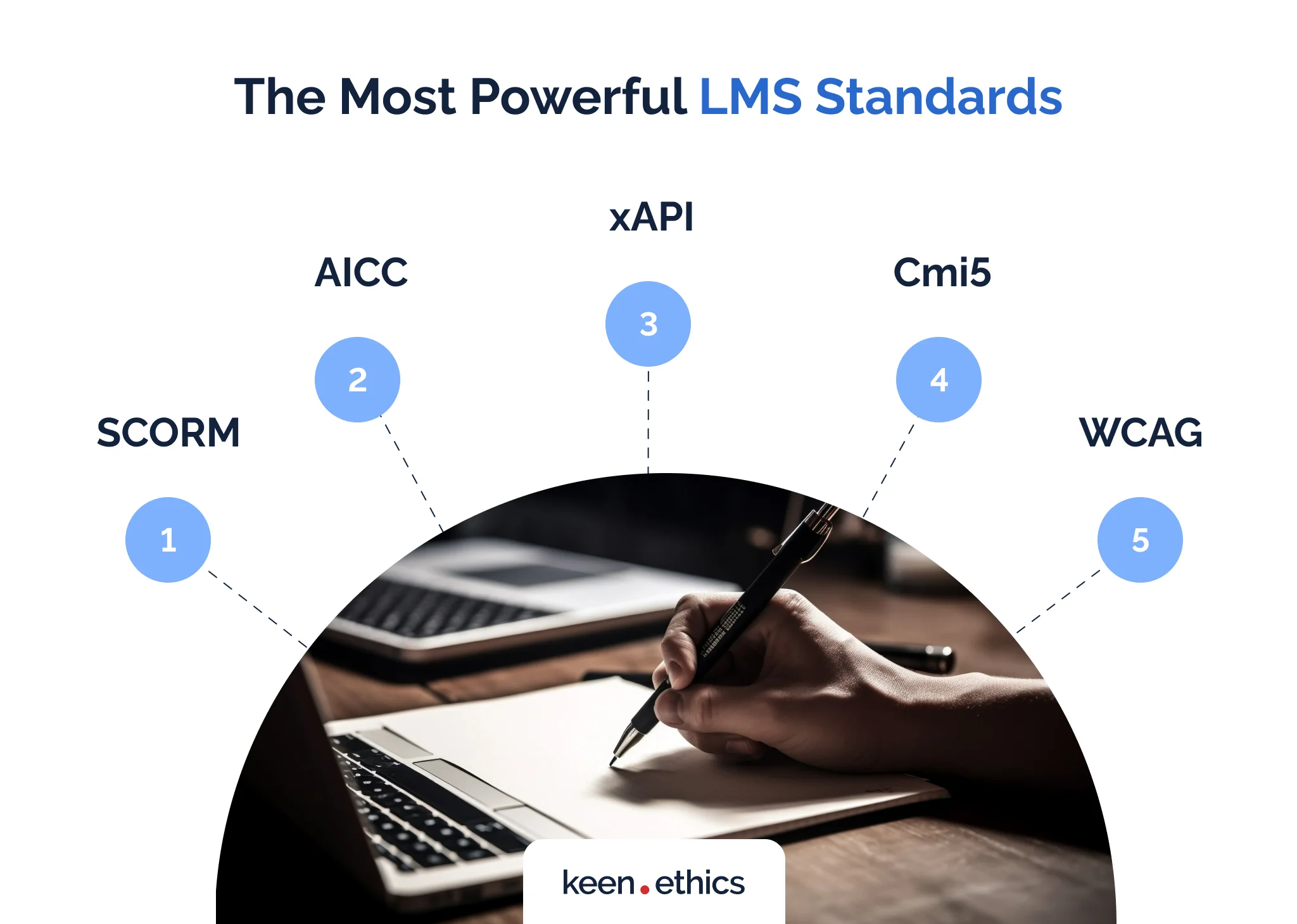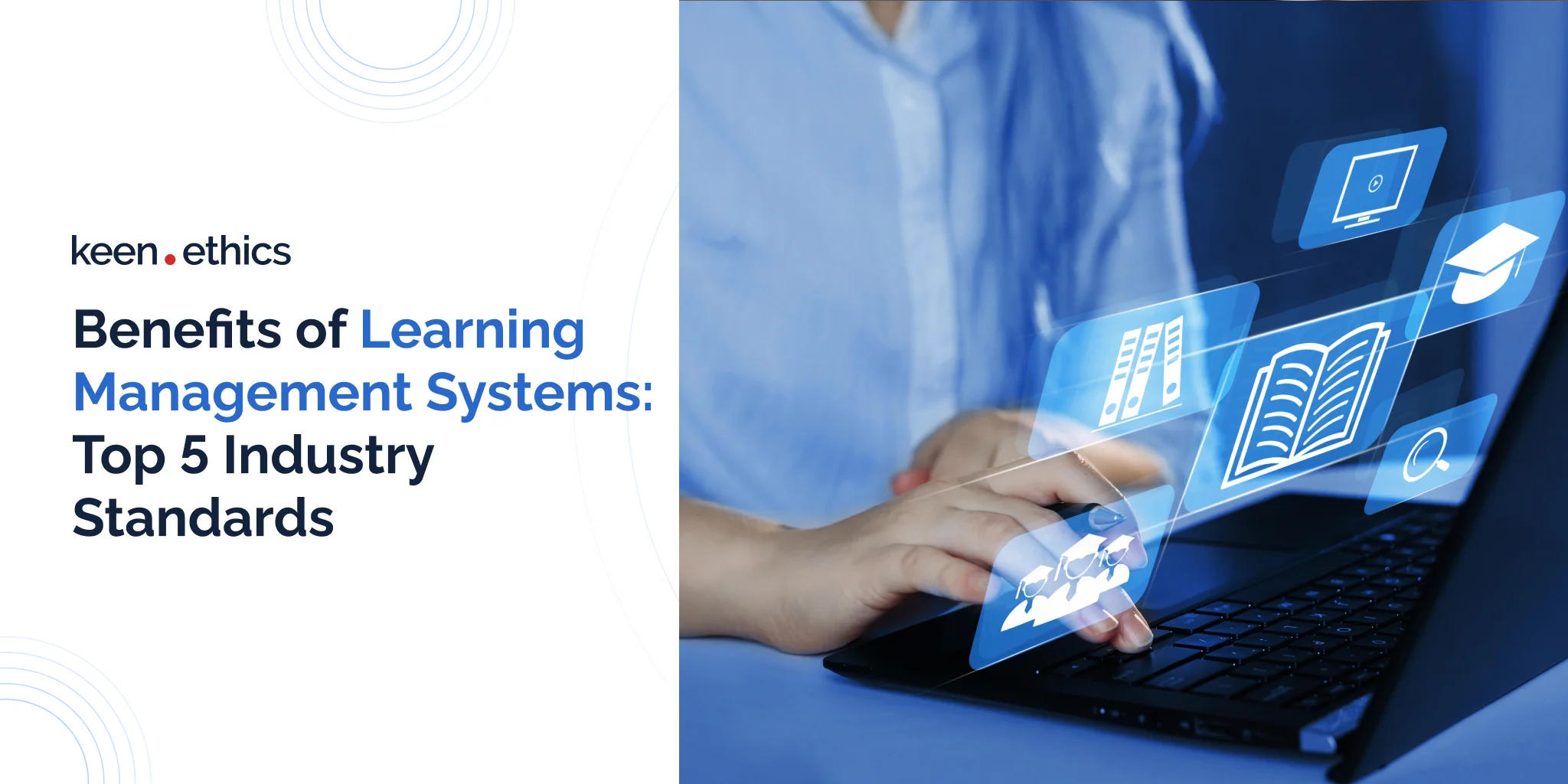Learn about the key reasons to develop your own Learning Management System in this article!
The development of investments in Learning Management Systems is a vital task for modern education organizations. Why? They enable them to improve the standards of education, one of the most important products delivered by the modern market. Education greatly enhances the incomes of graduates, being one of the vital pathways toward success. Thus, the pressure for schools and colleges to accept new approaches to education is tremendous. In this article, our goal is to look at 5 top industry standards for modern educational institutions.
What Is LMS Software?
LMS software stands for a Learning Management System. As its title implies, the core goal of these frameworks is to help various education organizations with managing learning experience. What do these tools typically include? Firstly, they must have a strong set of instruments for large-scale hosting. LMS frameworks typically work with numerous individuals; hence, they need to have a strong server part. Secondly, Learning Management Systems must have strong user interface features that enable teachers and students to engage in learning. The core functionality here involves platforms for demonstrating learning and training materials and various assessment frameworks. The students must have the capability to review training courses and the material in them. In turn, the teachers usually must have the capability to review their progress and make significant long-term judgments on it.
Common Features of LMS

Modern Learning Management Systems encompass a large number of must-have features for educational content. Here are some top elements you should consider if you’re willing to develop your system:
Ease of use
The primary feature that is essential for the success of Learning Management Systems is undoubtedly user-friendliness. The majority of LMS users aren’t technical specialists. These systems often are designed with the Humanities in mind. Consequently, you need to actively think about the ways to make such systems easy to use from any location. What’s our recommendation here? Put the most intuitive features to the forefront and leave the advanced configurations in the settings.
Integration
Another major aspect of a successful LMS is undoubtedly its ability to integrate with other systems. Many schools and universities work with different types of learning module types. For example, they may have some dedicated systems for testing the students provided by some proprietary developer. Many test bases may greatly depend on this software, making a transition to another project unfeasible. As a result, a good LMS app must have some compatibility tools. For instance, a good idea is to offer full-scale support for various formats such as SCORM.
Content management
There are two key learning paths in the majority of the education systems. Firstly, you need text content to deliver the core information to students. Secondly, a vital aspect to consider is audio and visual delivery. For example, complex math concepts require some outside explanation. This means that a strong LMS platform must have high-quality content management tools. Many LMS platforms focus on web technology for a reason: the web has some of the best frameworks for content management.
Support for mobile learning
The majority of the population is using smartphones these days. According to Statista, an average person in the UK spends approximately 6 hours every day on their smartphone. This figure amounts to one-fourth of the time a person has per day and, most likely, more than one-third of the active time a person has per day (if sleep is excluded). As a result, it’s logical from the standpoint of business performance to allow people to learn via their smartphone devices. They already spend tremendous amounts of time there, so the likelihood of engaging individuals in learning through these technologies is generally high. If your learning app doesn’t exist on mobile, most people won’t even consider it. Thus, mobile-centric integration should be a part of every business plan.
On-demand analytics and reporting
A major aspect of success for almost every activity is the ability to analyze data. Large improvements in education appeared with the onset of the information age: we learned about many ways to improve our systems through empirical evidence. Learning Management Systems are notable for their ability to boost information collection. They automate many tasks such as progress analysis, greatly boosting long-term progress for instructors in various companies. As a result, the absence of proper analytical tools in an LMS framework is more or less unacceptable. Many schools are willing to install such systems because they allow them to improve their approaches through evidence-based methods.
Testing and assessment
The core appeal of LMS technology is its ability to create a full-scale virtual classroom. Many schools invest in such systems because they interconnect every learning process within them. Hence, a strong LMS tool must focus not only on analytics or content management but also on the proper assessment. With a proper assessment system, teachers can easily enable distance learning and collect as much information about the progress of their students as possible.
Customization and branding
A big aspect of success for a good LMS tool is a wide range of customization and branding options. These authoring tools are used by different organizations with different goals. Firstly, there must be an ability to deliver new features for an LMS tool. For instance, a 3D modeling teaching school may need an integration of some 3D online learning tools. Secondly, every school or firm needs to showcase that certain content belongs solely to it. This is a perfect way to create a cohesive and professional experience for an average learner. Consequently, there’s a need for a major dedication to branding if you want to get a good return on investment.
Security
Lastly, Learning Management Systems are collecting a tremendous amount of information about students. For example, they may involve some personal information, such as their addresses. This information signifies that any hack into such a system can have a devastating impact on the learners. Our recommendation for any LMS developer is to focus on security to guarantee proper training ROI. An especially promising approach is to look at bank-grade solutions on the market.
Benefits of Learning Management Systems

There are multiple major benefits that modern Learning Management Systems bring about for learners. Let’s take a look at them:
Save business time
Above all, a high-quality LMS saves business owner time. What do we mean by that? Such systems are great at saving the labor of the core workers. Firstly, they reduce the amount of time one should spend on testing. Modern Learning Management Systems enable teachers to do them in a more or less automatic mode. Secondly, they simplify the analysis of data on the students. Lastly, they also simplify the preparation and teaching of various courses. The teachers now have an opportunity to record certain courses once and then reuse the educational material for several years. In short, LMS frameworks are among the core labor-saving technologies in education.
Save costs
Ultimately, the ability to save labor results in the ability to save costs, too. Learning Management Systems reduce the demand for teacher labor, for example. It’s possible to reuse the recorded course material. Thus, multiple schools can rely on one group of teachers if necessary. Moreover, the data analytics frameworks also reduce the requirements regarding large administrative staffs both in colleges/schools and for business organization needs. Here, the core benefit of LMS frameworks stems from their ability to collect and analyze information. All in all, they speed up the processing of information and make businesses in the education sphere more robust by greatly diminishing costs.
Enable simple customization and content updates
A major problem with traditional learning systems is the difficulty of customizing and updating content within them. Firstly, there’s the challenge of existing teaching resources. Many teachers may lack devices to showcase their core findings. Learning Management Systems reduce this issue by digitalizing all aspects of education. Secondly, the updates to content are also a major problem. Why? If you decide to change something in the middle of a teaching year or a customer training course, you’ll need extra effort to inform the students due to the lack of a centralized data repository. Most modern Learning Management Systems have advanced tools for warning students about the potential changes in their online training content.
Provide unlimited access to eLearning materials
Another core problem of traditional learning is the information availability. The central limitation of many traditional systems is that you often get to hear some information only once. For example, it’s possible to visit a lecture once and if there’s no supplementary material, you won’t find any other way to discover information.
This approach is highly detrimental for many students, who often have to combine studying with full-time work or, in the case of businesses, with domestic work. Therefore, the ability to have unlimited access to e-learning materials is one of the best positives. The learners finally get an opportunity to study at their pace instead of having to conform to the rigid schedules of modern universities. The rise of an AI-powered learning platform is also essential in this case: such platforms will also promote the ability to customize the obtained information.
Easily track learner progress and performance
Lastly, a core benefit of LMS frameworks is their ability to easily track learner progress and performance. This means that the process of collecting grades and other information about the students becomes fully automated. Hence, teachers can concentrate on more strategic decisions regarding learning than in the past. This aspect works great in businesses too: this approach is essential for employee learning and development.
The Most Powerful LMS Standards

There are multiple major learning standards to take note of when configuring all types of Learning Management Systems. Here are those standards:
SCORM
SCORM is a learning standard developed in the early 2000s to facilitate the development of the interactive learning management system standard. It’s one of the most popular standards on the market these days. The core benefits of the platform include:
1) Interoperability;
2) Content reuse
3) Standardization;
4) Strong tracking capabilities.
AICC
AICC is one of the oldest learning standards on the market. It was developed in the 1980s to help various aviation organizations. The core problem of the platform is that it’s used in a limited number of industrial sectors. At the same time, its positives include high flexibility and great capabilities for adding various types of complex, advanced content.
xAPI
xAPI is a platform developed in the 2010s to serve as a successor to frameworks like SCORM. The platform is notable for including many advanced features, such as better tracking and more diverse content. Despite the clear advantages, it, however, hasn’t gained widespread industry acceptance, such as the one enjoyed by SCORM. The platform is great for cases when you need advanced features, such as 3D visualization and VR.
Cmi5
CMI5 is one of the most recent (2016) platforms for various learning courses. It was created to resolve the core problems of platforms like SCORM and xAPI, such as their limits on cloud based deployment. How does this platform achieve its goal? It does this through its focus on the interoperability of different platforms and the presence of modern tools for an online course and additional feature creation. In many ways, CMI5 is notable for being close to xAPI and exists to bridge the gap between it and SCORM. The key aim of the project is to remove the gaps that prevent the upgrade of SCORM projects to newer standards.
WCAG
WCAG stands for Web Content Accessibility Guidelines. In this regard, WCAG isn’t a learning standard in a traditional sense. Instead, it’s a set of guidelines for the web. Since most LMS frameworks focus on the web, this means that the standards of inclusivity advanced by WCAG more or less apply to all Learning Management Systems. Consequently, you should actively consider this platform when using all of the above frameworks.
FAQ
What is the core goal of a learning management system?
The core business goal of a learning management system is to assist various organizations with planning and implementing training programs. These apps help you create autonomous courses with automatic tracking and testing. As a result, you get an opportunity to save time by reusing course data and, more importantly, collecting Big Data on the behavior of the students.
What are the core reasons to use an LMS within a business?
A big reason to use a Learning Management System is undoubtedly the ability to minimize expenditures on employee training. These systems reduce reliance on tutors for workers, making it possible to prepare a workforce with minimal resources via online training programs. Instead of having to waste the time of many individuals on preparing the next generation of the workforce, you can use it more efficiently, automating the creation of a positive business culture.
What are the core elements of a good Learning Management System?
In our opinion, the following elements are essential for a strong Learning Management System aimed at corporate training:
• Intuitive User Interface
• Robust Content Management System
• Scalability
• Customization and Personalized Learning Path Options
• Comprehensive Reports and Analytics
• Mobile Learning Compatibility
• Collaboration Tools
• Integration Capabilities with other systems
• Security Features
• Accessibility Compliance
We are not a purely LMS development company — but we do specialize in developing software for education and e-learning. We will gladly help you solve your LMS development challenges! Learn more about the education software development services that we offer.

























